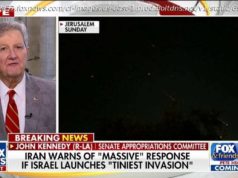Trump clearly believes belligerent rhetoric to threaten North Korea is the best way to approach Kim Jong Un, Vox reports.
On September 19, President Donald Trump gave his first speech to the United Nations General Assembly. His harsh rhetoric toward North Korea stood out — mostly because he threatened to obliterate the country of 25.4 million people .
« No nation on Earth has an interest in seeing this band of criminals arm itself with nuclear weapons and missiles, » Trump said, referring to the regime of North Korean leader Kim Jong Un. « The United States has great strength and patience, but if it is forced to defend itself or its allies, we will have no choice but to totally destroy North Korea. »
« Rocket Man is on a suicide mission for himself and for his regime, » he continued, using his new favorite nickname for Kim.
More from Vox: Where you can donate to help with hurricane and earthquake relief and recovery The far right’s « Free Speech Week » at UC Berkeley, explained While chairing Trump campaign, Manafort tried to set up private briefings for a Russian billionaire
Trump clearly believes that using this kind of belligerent rhetoric to threaten North Korea is the best way to get Kim to back down. But is it? Or does this kind of saber rattling only serve to increase the tension and make war more likely?
To find out, I reached out to eight North Korea experts and asked them for their reactions to the president’s remarks.
Several said that Trump’s threat to « totally destroy » North Korea was counterproductive and might encourage Kim to continue his nuclear and missile programs. Melissa Hanham, senior research associate in the East Asia Nonproliferation Program at the Middlebury Institute of International Studies at Monterrey, merely responded with a photo of Edvard Munch’s famous painting The Scream.
A few noted that it was similar to what other presidents, including President Obama, have said before. Several also expressed concern over the ambiguity of the threat — that it wasn’t clear if what, exactly, Trump was willing to do.
Only one expert I talked to felt Trump’s comment was a net positive. Matthew Kroenig told me that the president’s comments « reinforced the deterrence message. »
The experts’ full responses, lightly edited for clarity and style, are below.
Jeffrey Lewis, director of the East Asia nonproliferation program, Middlebury Institute of International Studies at Monterey
I think it’s important to understand why these remarks are so dangerous. I keep seeing people defending Trump, saying, « Who cares of we hurt Kim Jong Un’s feelings? » That totally misses the point.
Trump’s remarks make two mistakes. First, they actively aid North Korea’s propaganda because a lot of people in Japan and South Korea will conclude that Trump is as much the problem as Kim. Americans seldom pay attention to politics in allied countries, but they can be tremendously important.
Second, Trump is basically creating audience costs for Kim to back down. If you dare Kim, it creates pressure for him to respond with his own provocation. The last time we saw the North Koreans let a Trump threat pass, it was the comment about the intercontinental ballistic missile (ICBM) test not happening. In hindsight, it’s clear North Korea didn’t forget; it just took them time to be ready.
Trump acting like a fool isn’t the end of the world — at least he didn’t pull the nuclear codes out of his jacket and wave them around — but it does make our North Korea policy incrementally more difficult.
Kingston Reif, director for disarmament and threat reduction policy, Arms Control Association
First, the statement that « Rocket Man is on a suicide mission » is another alarming data point suggesting that the president does not believe Kim is rational or can be deterred. This follows on McMaster claiming last month that « classical deterrence theory » doesn’t apply to North Korea.
Never mind that there is no good reason to believe that North Korea can’t be deterred and contained, though of course this approach won’t be easy or risk-free. If the administration truly believes that North Korea can’t be deterred and that a nuclear-armed ICBM is unacceptable, then preventive military action becomes much more likely.
Second, Trump’s threatening and bombastic rhetoric will only serve to reinforce the view in Pyongyang that it must retain and augment its nuclear capabilities to prevent a US attack. It will also likely make it easier for North Korea to make this case to China. Trying to « out-Kim Jong Un » Kim Jong Un is not a winning strategy.
Third, Trump missed an important opportunity to appeal to the international community to better implement existing sanctions and support efforts for a realistic, negotiated solution. Pressure and threats alone won’t convince North Korea to change course. As President John F. Kennedy said following the 1962 Cuban Missile Crisis: « Above all, while defending our own vital interests, nuclear powers must avert those confrontations which bring an adversary to the choice of either a humiliating defeat or a nuclear war. »
Fourth, in trashing the Iran deal and threatening to unravel it, not only is Trump courting a second major nonproliferation crisis but he is putting a negotiated solution to reduce the North Korean threat even further out of reach. If Trump unravels the deal, Kim will understandably conclude that the United States can’t be counted on to live up any agreement he might strike with it.
Vipin Narang, associate professor of political science, MIT
A lot is being made [about] the « totally destroy » language, but it followed « if [the US] is forced to defend itself or its allies » — so it was still a retaliatory threat. The concern is that the standard formulation « effective and overwhelming » is a bit more calibrated and allows for flexibility in response.
To threaten to « totally destroy » North Korea in retaliation for behavior we find unacceptable seems to imply a devastating nuclear response. But we don’t know, and that’s the problem.
North Korea, the US, and its allies understand what « effective and overwhelming » means. We are left to guess if there is daylight between that and « totally destroy. » Maybe there is, maybe there isn’t. But that ambiguity does not do much to enhance deterrence, which requires clarity and consistency.
Melissa Hanham, senior research associate in the East Asia nonproliferation program, Middlebury Institute of International Studies at Monterey
Mira Rapp-Hooper, senior fellow, Yale Law School
I was disturbed by the president’s remarks on North Korea. While the phrasing of his threat to destroy North Korea was unfortunate, Trump actually made that threat contingent: North Korea would be destroyed if it attacked the US or its allies.
This is not inconsistent with threats made by past presidents. I was chilled by his contention that « Rocket Man is on a suicide mission, » because if Trump believes Kim to be suicidal, that implies the North Korean leader is neither rational or deterrable and may constitute a case for preventive war. We don’t know if the president believes this or is using it to put pressure on the Chinese, but either way, it’s dangerous.
Home
United States
USA — Science Trump threatened to 'totally destroy' North Korea. I asked 8 experts how...






